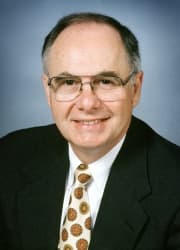
UNC Charlotte’s evolution from a commuter campus primarily serving undergraduate students to a research institution offering doctoral programs resulted from the drive of Chancellor Emeritus James Woodward.
To recognize the strong foundation laid by Woodward and his wife Martha, the University designated Woodward Hall in their honor.
The 222,220-square-foot, $33.2 million building, completed in May 2005, houses the College of Computing and Informatics and its departments of Computer Science and Software and Information Systems. The College of Liberal Arts & Sciences Department of Biological Sciences also is in Woodward Hall.
Born in Sanford, Fla., James H. Woodward grew up in Columbus, Ga. As a child, he was a Boy Scout and played ball at the local YMCA.
At 16, he married his childhood sweetheart, Martha. Woodward went on to complete high school and later enrolled at Auburn University. In 1959, Woodward entered the School of Aeronautics at Georgia Tech where he graduated first in his class in December 1961. After completing a bachelor’s degree, he received a fellowship for graduate studies, and he went on to earn a master’s degree in December 1962. He was awarded a Ph.D. in engineering mechanics in 1967.
From 1965 to 1968, Woodward taught as an assistant professor and later as an associate professor of engineering mechanics at the U.S. Air Force Academy in Colorado. He was promoted to captain in 1968. In that same year, he accepted a position as assistant professor of engineering mechanics at N.C. State University.
The next year, Woodward took a tenured position as associate professor of engineering at the University of Alabama at Birmingham (UAB). From 1969 to 1989, he held increasingly significant roles at UAB, serving as dean of the School of Engineering and ultimately as senior vice president at the institution.
In July 1989, Woodward became chancellor of the University of North Carolina at Charlotte, and he served in this capacity until his retirement on June 30, 2005.
During his tenure, Woodward endeavored to make UNC Charlotte one of the finest publicly funded research institutions. His commitment to the city of Charlotte combined with his belief that regional industries and local government were driving forces of growth proved pivotal to the success of the University.
Woodward realized the results of efforts to advance the University in 1993 when the UNC Board of Governors approved doctoral programs in applied mathematics, electrical engineering and mechanical engineering.
Beyond overseeing the University’s maturation into a doctoral-granting, research institution, Woodward was instrumental in generating support for the $3.1 billion Higher Education Bond referendum in 2000 that provided UNC Charlotte with $190 million to fund construction for academic space, including the facility that would become Woodward Hall. His wife Martha added efforts to strengthen ties to UNC Charlotte through hosting regional and national guests.
In addition to Woodward Hall, the sculpture “Wings of Pride” honors the former chancellor. Located in the Woodward Hall Quadrangle, “Wings of Pride’ was constructed by world-renowned Swedish artist Kent Ullberg. The bronze eagle statue stands 10 feet tall with a 19-foot wingspan; it recognizes Woodward’s previous service in the United States Air Force. The sculpture was commissioned by longtime UNC Charlotte supporter Irwin “Ike” Belk.
Four years after retiring as UNC Charlotte chancellor, Woodward was named by UNC President Erskine Bowles as interim chancellor of N.C. State University; he was credited for bringing much-needed stability to that institution after the departure of James Oblinger.
Known as an articulate visionary who reached out to the community and region, Woodward has said he wants to be remembered as “someone who was honest, who believed in the core principles that undergird higher education, who cared about people here.”